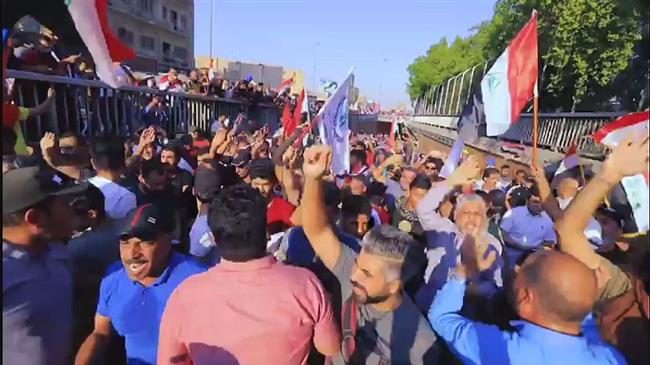Iraqi army bans gatherings outside Baghdad's Tahrir square as anti-govt. protests continue
The Iraqi army has warned that its forces will move in to break up any gathering outside Baghdad’s Tahrir Square, emphasizing its determination to put an end to chaos in the streets, which have been the scene of anti-government protests for several weeks.
Major General Abdul Karim Khalaf, the spokesman for the Commander-in-Chief of the Iraqi Armed Forces, told Al Forat TV network on Monday that the demonstrators had entered Baghdad’s Alawi region through the Ahrar Bridge in an attempt to approach the headquarters of the Ministry of Justice.
The bridge leads to the heavily-fortified Green Zone, which hosts Prime Minister Adel Abdul-Mahdi’s office and other government buildings.
Khalaf added a civilian building had been torched during the violence, but none of the protesters reached the prime minister’s office as security forces entered the scene and dispersed them.
Khalaf also announced that Iraqi forces will scatter gatherings outside the capital’s Tahrir Square and will not allow violence and chaos to rule the streets.
Iraqi forces, he said, will refrain from cracking down on protesters, but warned that important government buildings constitute “a red line.”
Khalaf further pointed out that Iraqi forces had on Monday managed to disperse 38 gatherings meant to block roads.
Baghdad’s Jumhuriya Bridge — another main bridge that links Tahrir Square to the Green Zone — is in a dangerous situation after “infiltrators” inflicted heavy damage on the structure by setting fire to its bases, he warned.

Security forces have in recent days tried to keep protesters from crossing the two main bridges to the Green Zone.
On Monday, thousands flocked into the streets of Baghdad.
There have been conflicting reports of casualties.
Reuters reported that at least six people, five in Baghdad and another in the town of Shatra, had been killed in clashes with security forces.
However, a spokesperson for the Iraqi premier disputed the claims about fatalities, telling the Doha-based Al Jazeera broadcaster that “no one has been killed [in Baghdad] this evening.”
Elsewhere, protesters shut off several local government offices and blocked roads in the cities of Nasiriyah and Diwaniyah.
On Sunday, Abdul-Mahdi called for markets, factories, schools and universities to reopen and appealed for an end to the protests that are hurting the Iraqi economy.
He said peaceful protesters must be differentiated from “outlaws” who had used demonstrators as “human shields” while attacking security forces.
Qais Khazali, the leader of the Asa’ib Ahl al-Haq, which is part of Iraq’s Popular Mobilization Units (PMU), told Iraqi TV that the US, Israel, certain Persian Gulf Arab states and local officials were working to “incite strife and chaos” in Iraq.
At the start of October, street protests erupted in several Iraqi cities over unemployment and a lack of basic services.
The rallies resumed on October 25 after a pause of about two weeks, but took a violent turn. Over 150 people lost their lives in the first round, according to official figures.
FM: Protecting political borders of regional countries Iran’s red line
Iran: Terrorism threatens peace, security and human rights
Iran manufacturing its own version of Boeing, Airbus engine parts: Official
Israel expands urbicide as tool of genocide in Gaza: Euro-Med
Iran’s semi-finished steel output down 4.3% y/y in Apr-Nov
VIDEO | Press TV's news headlines
Israeli snipers fire at patients, staff at northern Gaza hospital: Director
Gaza ceasefire deal within reach if Israel stops setting new conditions: Hamas
















 This makes it easy to access the Press TV website
This makes it easy to access the Press TV website